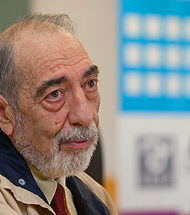Charles Darwin and Religion: The Story of a Dialogue between Science and Faith
seminar organized by the group of research Science Reason and Faith

Juan Pablo Martínez Rica, vice-president of the Royal Academy of Sciences of Zaragoza and researcher emeritus scientist of the committee Superior de Investigaciones Científicaswas in charge of giving the seminar of the group de research Science, Reason and Faith (CRYF) of the University of Navarra on April 8.
The talk focused on the life and work of Charles Darwin (1809-1882) while also alluding to his predecessors and successors in the formulation of the theory of evolution .
Professor Martínez Rica argued that Darwin was the author of the greatest scientific and cultural revolution in history: his greatest influence was on biology, although his best known work, "The Origin of Species" (1859), also had a notable impact on sociology and psychology. The 1250 copies of the first edition were sold out in one day.
His forerunners in the 18th century were Carl Linnaeus (1707-1778), who recognized the possibility of changes in species, but as a result of hybrids; Georges Louis de Buffon, who opposed von Linne and wrote a Natural History (1707-1788) and his own grandfather Erasmus Darwin (1731-1802). In the 19th century, Jean Baptiste de Lamarck (1744-1829) and George Cuvier (1769-1832), a contemporary of Charles Darwin and his declared opponent, stand out.
Charles Darwin did not finish the careers of Medicine and Priesthood that he started. His interest in natural history was innate, but it was accentuated by the influences of different teachers, mainly John Henslow, an Anglican priest who taught botany and geology at Cambridge University, and who many years later would work as a pastor in a rural parish. In 1831, at the age of 22, he embarked on the "Beagle", a ship that sailed around the world to map the coasts of America, and that trip changed his life: there he had the opportunity to read Lyell and his work "Principles of Geology", which converted him to gradualism. Malthus and his "Principle of Population" were also decisive.
The religious process in Darwin was that of a progressive withdrawal of the Christian faith. It was so slow that, according to Darwin himself, it did not cause him any psychological trauma. Several factors influenced him in this process. Some say that the most determining factor was the death of his daughter at the age of 10. But the gradual withdrawal of faith had already begun years before. It began with a cooling of the piety he experienced at a very young age, which was replaced by a growing interest in science. It continued with the loss of faith in the Old Testament when he did not accept a God who appeared to him as violent and, later, also in the New Testament when he did not accept the miracles narrated in it. The death of his father also had a negative influence on this process.
In any case, it does not seem that he completely abandoned his faith in God. "In fact, his religious attitude oscillated between these extremes, tending to be more agnostic before believers, and more theistic before atheists," said researcher Martínez Rica.
